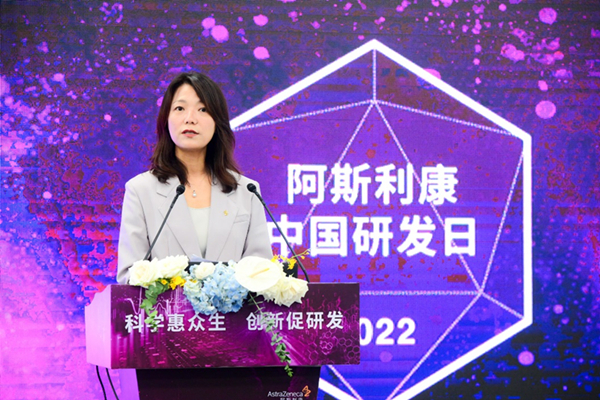AstraZeneca looks to China for new innovation
- By Guo Yiming
 0 Comment(s)
0 Comment(s) Print
Print E-mail China.org.cn, July 1, 2022
E-mail China.org.cn, July 1, 2022
Global pharmaceutical giant AstraZeneca is betting big on innovation in China as the company continues to increase its R&D presence in the world's second largest healthcare market.

At the company's "R&D China Science Day" on Thursday, AstraZeneca launched a translational medicine research grant designed to support and encourage Chinese clinicians to engage in basic medical research, improve R&D capacity and facilitate strategic partnership in the early research of diseases to better serve Chinese patients.
Translational medicine, also known as "bench to bedside," refers to the collaboration between biomedical researchers and traditional healthcare professionals in developing new ways to improve patient diagnosis and corresponding treatment methods.
At the event, the company also introduced CoSolve, part of AstraZeneca's global Open Innovation program, to China.
The program focuses on AstraZeneca's "nine innovation needs" centered around its research priorities and invites Chinese startups and research institutes to propose solutions to empower Chinese innovation to participate in global new drug development.
The program marks AstraZeneca's latest move as the company continues to expand its R&D footprint in its second largest market after the inauguration of its newly upgraded R&D center in Shanghai last October, which involved increased investment, pipeline expansion, hardware upgrades and headcount growth.
"China has become an increasingly important player in AstraZeneca's global R&D network," said Dr. He Jing, senior vice president of AstraZeneca and head of AstraZeneca R&D China. "We have always been confident in the prospects of biopharmaceutical innovation in China, and the global R&D leadership team has continuously provided great support in the expansion and development of the China R&D team."
By 2023, AstraZeneca's R&D investment in China is expected to be 2.5 times that of 2020, and the number of R&D employees in China is expected to top 800, marking a 60% increase from 2020, according to data released by the company.
China's pharmaceutical innovation has now moved from the world's third echelon to the second echelon, and is narrowing its gap with countries in the first echelon, judging from the number of pharmaceutical innovations and their contributions to the world as well as the number of innovation pipelines, according to a report jointly published by the China Pharmaceutical Innovation and Research Development Association and the R&D-based Pharmaceutical Association Committee under the China Association of Enterprises with Foreign Investment.
"The company's continued R&D investment in China reflects our optimism in China's innovation as well as the country's biopharmaceutical industry," said Dr. He, citing the country's pro-innovation policies, its world-class research institutes and large talent pool, all of which the company believes are key to the growth of the biopharmaceutical industry.
AstraZeneca's R&D pipeline in China currently has over 150 projects, of which nearly 90% are being developed simultaneously with its global pipeline. It is expected that 10-15 new projects will be added every year, and around 60 to 65 new molecular entities or new indications will be approved within five years, according to the company.
AstraZeneca's R&D center in China is also expanding its scope to early research of new drugs and develop new treatments to meet China's unique medical needs, Dr. He added.






Go to Forum >>0 Comment(s)